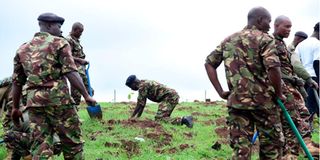Fighting climate change for peace, security

Kenya Defence Forces soldiers plant trees at Ngong Hills Forest Recreational Park in Kajiado county on May 4, 2022.
The interplay between climate change, peace and security is profoundly intricate.
While climate change exacerbates risks to peace and stability, insecurity makes adaptation to climate-induced impacts even more difficult.
What was once seen as natural fluctuations in temperature and weather are now driven by human activities such as deforestation and fossil fuel consumption.
Globally, climate change poses a serious threat to security, catalysing instability and conflict.
From the Sahel to the Amazon, the Arctic to the Horn of Africa, competition for dwindling natural resources like land and water escalates tensions.
Political and economic exploitation of energy resources further aggravates these conflicts.
Although climate change itself may not directly cause insecurity, it amplifies existing political, social and economic pressures, transforming manageable risks into crises.
In fragile states where systems are already strained, climate change acts as a “threat multiplier”, leading to mass migration, desertification and competition over scarce resources.
These factors increase the likelihood of instability and conflict, worsening social inequalities and exposing vulnerable communities to new risks.
In Kenya, the impacts of climate change are felt acutely, especially in our efforts to maintain peace and security.
Water scarcity
Water scarcity and drought have already triggered conflicts in various regions. When communities are unable to cope with these environmental pressures, competition for resources intensifies, reducing their ability to respond effectively.
This often leads to marginalisation, discrimination and political instability.
In locales like Laikipia, where pastoral, agropastoral and farming communities coexist, resource-related conflicts are a daily reality.
Water and pasture scarcity has intensified competition, leading to clashes between pastoralists and farmers, and even between people and animals.
Despite many people practising both livestock-keeping and small-scale farming, tensions often emerge along tribal lines, resulting in deadly confrontations.
To build a Kenya where communities coexist peacefully, we must invest in environmental conservation to mitigate the harsh effects of climate change.
The government’s 15 billion trees campaign target is a commendable initiative with the potential to significantly contribute to preserving our forests and water catchment areas.
Nevertheless, the onus cannot rest solely on the government.
Every Kenyan must participate in the fight against climate change.
We must assume collective stewardship of our environment, understanding that addressing climate change is not just about survival but also about securing peace and stability for ourselves and future generations.
Together, we can forge a peaceful and secure Kenya, resilient against the devastating effects of climate change.
Dr Mariru is the Defence Principal Secretary and an advocate for sustainable development.





